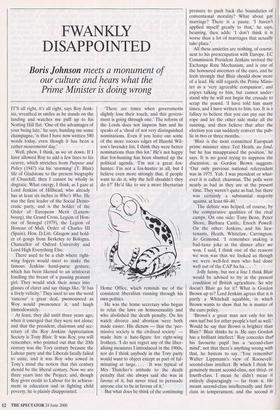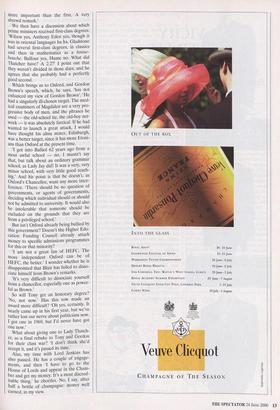FWANKLY DISAPPOINTED
Boris Johnson meets a monument of
our culture and hears what the Prime Minister is doing wrong
IT'S all right, it's all right, says Roy Jenk- ins, wreathed in smiles as he stands on the landing and watches me puff up to his Notting Hill flat. 'One of the advantages of your being late,' he says, handing me some champagne, 'is that I have now written 580 words today, even though it has been a rather mouvemente day.'
Well, phew, I think, as we sit down. If I have allowed Roy to add a few lines to his oeuvre, which stretches from Purpose and Policy (1947) via his 'storming' (T. Blair) life of Gladstone to the present biography of Churchill, then I cannot be wholly in disgrace. What energy, I think, as I gaze at Lord Jenkins of Hillhead, who already has at least six inches in Who's Who. He
was the first leader of the Social Demo- cratic party, and is the holder of the Order of European Merit (Luxem- bourg), the Grand Cross, Legion of Hon- our of Senegal (1979), the Legion of Honour of Mali, Order of Charles III (Spain), Hon. D.Litt. Glasgow and hold- er of gongs from Berkeley to Bologna, Chancellor of Oxford University and Lord High Everything Else.
There used to be a club where right- wing fogeys would meet to make the famous Jenkins hand-purse gesture, which has been likened to an aristocrat fondling the breast of a passing peasant girl. They would stick their noses into glasses of claret and say things like, 'It has a lively velleity.' They used to use the word `rancour' a great deal, pwonounced as Woy would pwonounce it, and laugh immodewately.
At least, they did until three years ago, when it emerged that they were not alone; and that the president, chairman and sec- retary of the Roy Jenkins Appreciation Society is Tony Blair. It was Roy, you will remember, who pointed out that the 20th century was the Tory century because the Labour party and the Liberals fatally failed to unite, and it was Roy who sowed in Tony's mind the notion that this century should be the liberal century. Now we are three years into the Project; and, though Roy gives credit to Labour for its achieve- ment in education and in fighting child poverty, he is plainly disappointed. `There are times when governments slightly lose their touch, and this govern- ment is going through one.' The reform of the Lords does not impress him and he speaks of a 'shoal of not very distinguished nominations. Even if you leave out some of the more rococo edges of Harold Wil- son's lavender list, I think they were better nominations than this lot.' He's not happy that fox-hunting has been shunted up the political agenda. 'I'm not a great fox- hunter. I'm not a fox-hunter at all, but I believe even more strongly that, if people want to do it, why the hell shouldn't they do it?' He'd like to see a more libertarian Home Office, which reminds me of the consistent liberalism running through his own politics.
He was the home secretary who began to relax the laws on homosexuality and who abolished the death penalty. On his watch divorce and abortion were both made easier. His dictum — that the 'per- missive society is the civilised society' made him a hate-figure for right-wing frothers. 'I do not regret any of the liber- alising measures I introduced in the 1960s, nor do I think anybody in the Tory party would want to object except as part of ful- minating at large. . . . It was typical of Mrs Thatcher's attitude to the death penalty that she always said she was in favour of it, but never tried to persuade anyone else to be in favour of it.'
But what does he think of the continuing pressure to push back the boundaries of conventional morality? What about gay marriage? There is a pause. 'I haven't applied myself greatly to that,' he says, beaming, then adds: 'I don't think it is worse than a lot of marriages that actually take place.'
All these anxieties are nothing, of course, next to his preoccupation with Europe. EC Commission President Jenkins revived the Exchange Rate Mechanism, and is one of the honoured ancestors of the euro, and he feels strongly that Blair should show more of a lead. He still regards the Prime Minis- ter as a 'very agreeable companion', and enjoys talking to him, but cannot under- stand why he will not begin the crusade to scrap the pound. 'I have told him many times, and I have written to him, too. It is a fallacy to believe that you can pay out the rope and let the other side make all the running, and then believe that after the election you can suddenly convert the pub- lic in two or three months.
`Blair is the most committed European prime minister since Ted Heath, au fond, but he has misappraised the position,' he says. It is no good trying to suppress the discussion, as Gordon Brown suggests. `Our only previous national referendum was in 1975. Yah. I was president or what- ever it is called; chairman. The polls were nearly as bad as they are at the present
time. They weren't quite as bad, but there was certainly a substantial majority against, at least 60-40.'
The debate was helped, of course, by the comparative qualities of the rival camps. On one side: Tony Benn, Peter Shore, Barbara Castle, Enoch Powell. On the other: Jenkins, and his lieu- tenants, Heath, Whitelaw, Carrington, Jo Grimond. 'I remember making a bad-taste joke at the dinner after we won. I said, I think one of the reasons we won was that we looked as though we were well-fed men who had done well out of the CAP ha ha.. . . '
Jolly funny, but not a line I think Blair would be advised to try in the present condition of British agriculture. So why doesn't Blair go for it? What is Gordon Brown up to? Lord Jenkins agrees that it is partly a Whitehall squabble, in which Brown wants to show that he is master of the euro policy.
`Brown's a great man not only for his own turf but for other people's turf as well.' Would he say that Brown is brighter than Blair? 'Blair thinks he is. He says Gordon has a brilliant intellect.' Roy concedes that" his favourite pupil has a `second-class mind', not that there's anything wrong with that, he hastens to say. 'You remember Walter Lippmann's view of Roosevelt: second-class intellect. By which I think he genuinely meant second-class, not third- or fourth-class. I mean he didn't mean it entirely disparagingly — far from it. He meant second-class intellectually and first- class in temperament, and the second is more important than the first. A very shrewd remark.'
We then have a discussion about which prime ministers received first-class degrees: `Wilson yes, Anthony Eden yes, though it was in oriental languages ha ha. Gladstone had several first-class degrees, in classics and then in mathematics as a bonne- bouche. Balfour yes, Hume no. What did Thatcher have? A 2:2?' I point out that they weren't divided in those days, and he agrees that she probably had a perfectly good second.
Which brings us to Oxford, and Gordon Brown's speech, which, he says, 'has not enhanced my view of Gordon Brown'. 'He had a singularly ill-chosen target. The med- ical examiners of Magdalen are a very pro- gressive body of men, and the phrases he used — the old-school tie, the old-boy net- work — it was absolutely farcical. If he had wanted to launch a great attack, I would have thought his alma mater, Edinburgh, was a better target, since it has more Etoni- ans than Oxford at the present time.
`I got into Balliol 62 years ago from a most awful school — no, I mustn't say that, but talk about an ordinary grammar school, as Lady Jay did! It was a very, very minor school, with very little good teach- ing.' And his point is that he doesn't, as Oxford's Chancellor, want any more inter- ference. 'There should be no question of governments, or agents of governments, deciding which individual should or should not be admitted to university. It would also be intolerable that someone should be excluded on the grounds that they are from a privileged school.' But isn't Oxford already being bullied by this government? Doesn't the Higher Edu- cation Funding Council already attach money to specific admissions programmes for this or that minority? `I am not a great fan of HEFC. The more independent Oxford can be of HEFC, the better.' I wonder whether he is disappointed that Blair has failed to disso- ciate himself from Brown's remarks.
`It's very difficult to dissociate yourself from a chancellor, especially one as power- ful as Brown.'
So will Tony get an honorary degree? `No, not now.' Has this row made an award more difficult? 'Oh yes, certainly. It nearly came up in his first year, but we've rather lost our nerve about politicians now. I got one in 1969, but I'd never have got One now.'
What about giving one to Lady Thatch- er, as a final rebuke to Tony and Gordon for their class war? 'I don't think she'd accept it, and it's passed its time.' Alas, my time with Lord Jenkins has also passed. He has a couple of engage- ments, and then 'I have to go to the House of Lords and appear in the Cham- ber and get my money. It's a most discred- itable thing,' he chortles. No, I say, after half a bottle of champagne: money well earned, in my view.



































































 Previous page
Previous page